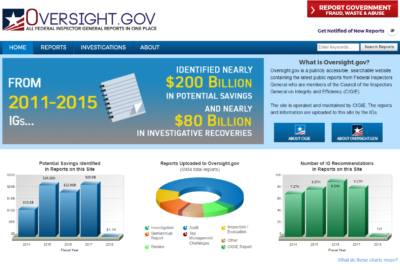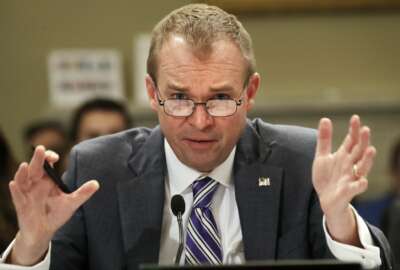
Interior whistleblower leaving agency after reassignment
In today's Federal Newscast, the senior executive at the Interior Department who blew the whistle about the agency's involuntary reassignments of many executive...
To listen to the Federal Newscast on your phone or mobile device, subscribe on PodcastOne or iTunes.
- Joel Clement, senior executive at the Interior Department, who blew the whistle on the agency’s involuntary reassignments of many executives will resign. In a letter to Interior Secretary Ryan Zinke, Clement said retraining for his new position would be a waste of his colleagues’ time and taxpayer dollars. He also named poor leadership among his reasons for leaving. The Office of Special Counsel will continue to investigate Clement’s whistleblower claim.
- Federal employees will pay an average of 6.1 percent more for their health care premiums in 2018. The Office of Personnel Management announced the Federal Employee Health Benefit Program premium rates ahead of the 2018 open season, running from Nov. 13 through Dec. 11. The government will contribute 3.2 percent more toward those premiums. (Federal News Radio)
- A plan put forth by he Internal Revenue Service will look into modernizing one of its oldest IT systems. IRS Chief Information Officer Gina Garza told Congress it will take $425 million and five years to update code running its Individual Master File. The Master File is responsible for processing tax returns. (Federal News Radio)
- DHS is figuring out how to make a key cyber program more valuable. The sharing of cyber threat information happens too often and only in one direction. Despite repeated efforts to create two-way sharing between the Homeland Security Department and the private sector, the perceived and real barriers continue to limit these efforts under the Automated Information Sharing or AIS program. One major challenge is concerns by company general counsels about liability protections. DHS will review its information sharing programs to ensure the agency provides industry with the right data in a timely fashion.
- A new bill to boost Voluntary Separation Incentive Payment that will offer from $25,000 to $40,000 received the go-ahead from the Senate Homeland Security and Governmental Affairs Committee. The committee also passed a few other bills to give agencies direct hire authority to quickly bring on college students and recent graduates. Another bill would elevate the role of the agency whistleblower ombudsman. (Federal News Radio)
- EPA Scott Pruitt has planned to revive a more business friendly approach to environmental regulation. Pruitt hark back to the way EPA operated during the George W. Bush administration. He wants to maintain an open dialog with regulated businesses. Pruitt calls the program Smart Sectors…and says its aimed at both better environmental outcomes and more predictability for business. Smart Sector features will include site tours, round tables with EPA leadership, and ombudsmen to streamline the internal complexity of the agency itself. (Environmental Protection Agency)
- A site is chosen for the repair of the Navy destroyer which collided with a merchant ship near southeast Asia. The USS John McCain is on it’s way to the U.S. Naval Ship Repair Facility-Japan Regional Maintenance Center in Yokosuka, Japan. It’s been moored in Singapore since the August crash. Investigations are still ongoing to determine more facts about the incident. (Navy)
- Newly-declassified documents show the intelligence community knew a lot more about the first satellite ever to reach space. The Soviet Union’s launch of Sputnik in 1957 was a shock to most Americans, but new documents disclosed by the CIA show the agency knew about the project several years before. The documents also show that president Eisenhower was briefed on the intelligence, and that the CIA’s director had urged DoD to spend more attention on satellites so that the U-S could beat the Russians to space. (Federal News Radio)
- Help is coming for civilian agencies to better meet the requirements of contract audits. The General Services Administration led an interagency working group to develop a Civilian Contract Audit Services Ordering Guide. Now GSA wants feedback on that effort. The ordering guide detailed best practices for issuing task orders against the GSA Multiple Award Schedules for professional services to fill agencies’ contract audit needs. Comments are due October 27. (FedBizOpps)
Copyright © 2024 Federal News Network. All rights reserved. This website is not intended for users located within the European Economic Area.
Eric White
Eric White is news anchor and Federal Drive producer at Federal News Network.
Follow @FEDERALNEWSCAST
Related Stories

Amid Price resignation, OMB warns agency leaders; VA becomes more transparent
Related Topics




